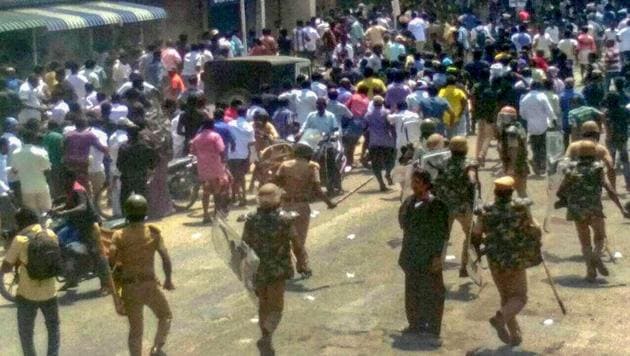Madras HC stays work at Sterlite unit after violent protests, rights body sends notice to Tamil Nadu
Protesters who blame the Sterlite copper plant, one of India’s biggest, for health problems and depleting water allegedly set vehicles on fire and stoned policemen in the coastal city in southern Tamil Nadu on Tuesday.
A court suspended the expansion of a copper smelting plant and India’s human rights watchdog sent notices to the Tamil Nadu government on Wednesday after police firing on protesters marching against the facility a day before killed nine people in Thoothukudi city.

The Madurai bench of the Madras high court ordered the Vedanta group to stop the expansion of its Sterlite copper plant in the coastal city also known as Tuticorin, reported The Hindu newspaper. The court said the company’s plea for renewing its environment clearance should be processed within four months after conducting a public hearing.
Thousands of protesters on Tuesday hurled stones at security personnel, set vehicles on fire and attacked government offices in the port town, around 600 km from the state capital of Chennai.
The National Human Rights Commission asked Tamil Nadu’s chief secretary and director general of police (DGP) to give it a report within two weeks, reports news agency ANI. The union home ministry asked the Tamil Nadu government to give it details about the violence.
◼ October 1996: Plant starts operating, almost immediately clearances challenged before the Madras high court
◼ August 1997: Protests begin after complaints of air and water pollution.
◼ November 1998: Interim order by the high court to close the plant, but reopened weeks later after company agrees to put pollution safeguards
◼ January 2001: Complaints by locals of polluted water and release of toxic waste water from the plant
◼ September 2010: Madras high court orders closure of the plant over pollution concerns but reopened less than a week later after Supreme Court stays the order
◼ March 2013: Tamil Nadu pollution control board orders closure of the plant after a gas leak
◼ April 2013: Supreme Court fines Sterlite Rs 100 crore for pollution but doesn¡¦t order closure of the plant
◼ May 2016: Madras high court dismisses petition challenging expansion on the grounds that no public consultation was held
◼ February 2018: Fresh protests after reports that Sterlite is looking to expand the plant and increase capacity
◼ March 2018: Plant shuts for maintenance
◼ April 2018: Tamil Nadu pollution control board refuses to renew plant’s license
Tamil Nadu chief minister Edappadi K Palaniswami’s government, which is under severe criticism for the deaths, announced retired high court judge Aruna Jagadeesan will head a one-person commission to probe the violence. The commission has not been given a deadline.
Opposition leader MK Stalin, working president of the DMK party, accused Palaniswami’s government of murder. “Will @CMOTamilNadu take action against DGP for failing to maintain law and order? Will Chief Secretary explain her role in this entire episode? Will there be justice for #SterliteProtes?” said Stalin on Twitter.
“We must know who ordered this firing. It is not me but the victims who are demanding this. Merely announcing compensation isn’t a solution. This industry must be shut and this is what people demand,” said actor-politician Kamal Haasan.
The plant, one of India’s largest such facilities, has had a troubled history since it began operations in 1996. People have blamed it for their failing health and a major gas leak in 2013 led the Supreme Court imposing a Rs 100- crore fine. The plant has been closed down repeatedly in the past two decade, the last time by the Madras high court in 2013 over similar pollution concerns.
Shares of Vedanta Ltd declined both on the BSE and NSE.
(With agency inputs)






